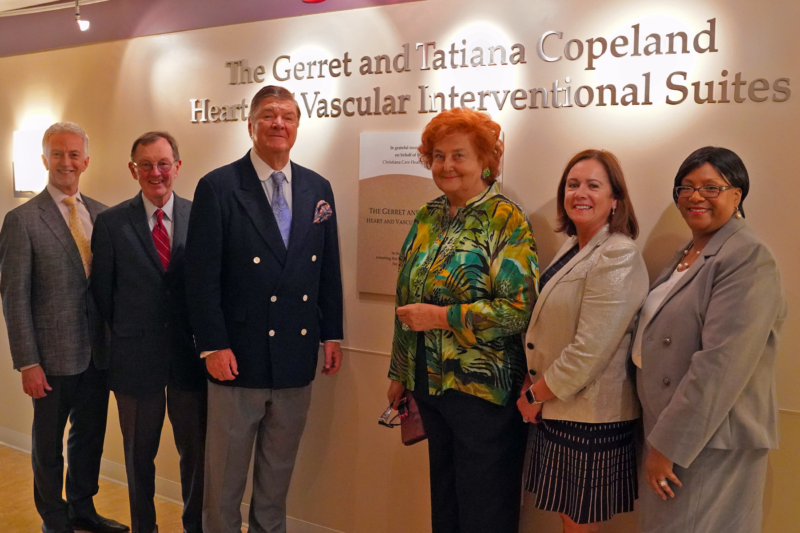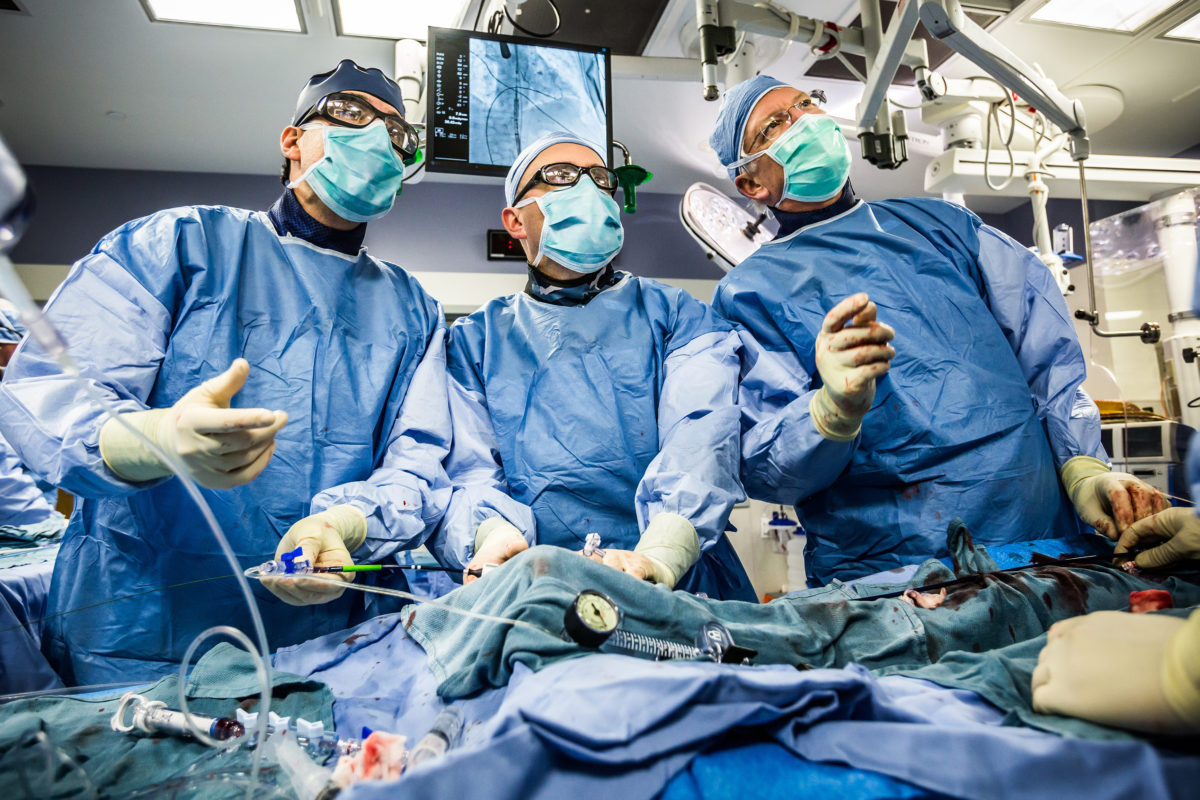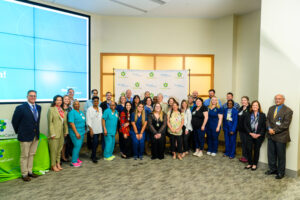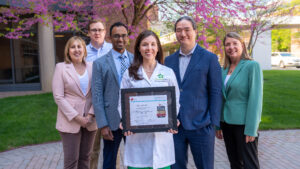One June morning, Jacobo Moreta went to work like any other day, but there was nothing normal about the next 24 hours. The Wilmington resident wasn’t feeling well when he set out. When he still felt poorly midday, Moreta’s daughter called his doctor, who sent her father to Wilmington Hospital’s Emergency Department (ED).
From the ED, Moreta was admitted to Wilmington Hospital’s Cardiology Care unit for testing, one of the first patients in the new nine-bed suite that opened in late May, advancing the hospital’s ability to treat cardiac-related cases in the city.
“We’re supporting our community close to home with the right care, in the right place, at the right time,” said Brian Sarter, M.D., medical director of the cardiac care units.
“Before the Wilmington Hospital Cardiology Care unit opened, we often had to send patients who came to us with heart concerns to Christiana Hospital,” he said. “Now, we have the capabilities to treat many of them at Wilmington, right here at home.”
The unit provides care for a range of cardiac conditions, including heart failure, at Wilmington Hospital, reducing the need for transfers to Christiana Hospital. The goal is to let patients receive needed care closer to where they live.
“For many people in the city of Wilmington, having high-quality heart care nearby makes a tremendous difference,” said Kirk Garratt, M.D., M.Sc., medical director of Christiana Care’s Center for Heart & Vascular Health.
Last year, more than 2,500 people from the Wilmington area were transferred from Wilmington Hospital to Christiana Hospital for step-down care—the level between intensive and regular inpatient—or traditional inpatient observation and cardiac care.
Today, these patients would likely stay in Wilmington, receiving the same quality treatment and opening more beds at Christiana Hospital for other patients.
“It allows families to be with loved ones during care while also balancing obligations at home and work,” said Dr. Garratt. “We are committed to delivering care to our Wilmington neighbors in ways that provide them with the best possible experience.”
If patients need specialty services like heart catheterization or surgery, they are transferred to the Christiana Care Center for Heart & Vascular Health at Christiana Hospital.
That was the case with Moreta, who received more intensive services in the Gerret and Tatiana Copeland Heart & Vascular Interventional Suite at Christiana Hospital. The experience was seamless, and “everything was great,” he said.
Meanwhile, Down the Road A Bit
The new Wilmington Cardiology Care unit is one of two major additions to Christiana Care’s nationally respected Heart & Vascular program.
In late June, the health system celebrated opening a state-of-the-art hybrid operating room (OR), also known as a structural heart lab, in the Gerret and Tatiana Copeland Heart & Vascular Interventional Suite at Christiana Hospital.

The bright, dynamic, state-of-the-art suite is for innovative procedures targeting conditions affecting the heart’s structures— the valves, heart chambers and related parts.
“We’ll do all advanced cardiac procedures here for patients when traditional surgery is too risky or not an option — transcatheter aortic valve replacement (TAVR), for example, and other device placements and cardiac interventions,” said Wasif Qureshi, M.D., medical director, Structural Heart Diseases.
With the hybrid OR, Christiana Care is the only health system in Delaware offering a comprehensive structural heart disease program, taking care to the next level for improved patient experiences and outcomes.
“When patients come in for evaluation, they can have a same-day experience,” Dr. Qureshi said. “Previously, we had to schedule people on separate days for catheterization and surgery. Now we can get patients evaluated and treated in a more timely manner—for some heart and vascular problems, we can do all procedures in the same suite.”
Dr. Qureshi said the space also can be used for open heart surgery, which improves patient experience and patient outcomes.
Christiana Hospital’s roughly 1,000-square-foot hybrid OR is a gold standard in structural heart care intervention where multiple medical teams have the room to work together. Patients stay in one area, rather than moving from space to space for different treatment processes, improving patient experience and reducing risk of infection.
An OR for Today—and Tomorrow
A focus of the hybrid OR is minimally invasive valve procedures like TAVR.
“We’ve seen a large shift from open surgical procedures, so we need the technology and space to meet this need in our community,” said Billie Speakman, MBA, RRT, FABC, vice president for Heart & Vascular Services and Women & Children’s Services.
Annually at Christiana Care, more than 34 percent of all cardiac procedures are valve related, and the demand is experiencing a growth spurt.
Until recently, TAVR was used only with patients who were unlikely to do well with open heart surgery. In 2015, the Food and Drug Administration (FDA) approved the approach for cases where surgery was possible but very risky. A year later, the FDA greenlighted TAVR for intermediate-risk patients, creating a booming demand. Approval for low risk patients could come later this year.
“We project a much larger number of all of these procedures moving forward,” said Dr. Garratt. “And with good reason—patient outcomes for TAVR cases don’t just rival surgical outcomes but can actually exceed them. As a health system that promises effective service and value, we provide expert care in leading-class facilities so that patient risks are minimal and outcomes optimal.”
Dr. Garratt added that the OR meets today’s needs and is also designed for tomorrow’s expectations.
“Along with our TAVR work, the mitral procedures we do today are cutting edge, and we know there’s a revolution coming in mitral valve care,” he said. “This space has been configured to accommodate all of that and then some.”
Christiana Care is the leading regional provider of structural heart disease interventions—since the program started in 2012, the Center for Heart & Vascular Health surgeons performed more than 500 TAVR procedures as of 2018. The hybrid OR will further boost the capacity to an estimated 200 procedures per year.
Best Experiences, Best Outcomes
Improvement, like adding these two facilities, is a continuous effort at a health system ranked by U.S. News and World Report as a leader in heart failure care, heart bypass surgery, aortic valve surgery and abdominal aortic aneurysm repair, among other non-heart and vascular services.
The new spaces are part of a larger system-wide standardization of care initiative focused on providing the best patient experience and outcomes and most value to the health system and larger community.
“In heart care delivery there’s tremendous variation across the country, both in how patients are selected for procedures and how the procedures are conducted,” said Dr. Garratt. “We’re spending a lot of time now in cardiovascular care and other parts of our organization looking at how we deliver care.”
This standardization, he added, never replaces the patient-first focus. Rather, it provides a proven starting point for treating specific conditions and diseases.
“We start by looking at what the best approach is overall and ensuring our hospitals offer the right care at the right time and in the right place,” he said. “Then we tailor our standard approach, as needed, to the unique needs of each individual patient.”
The team achieves this, said Dr. Garratt, by serving together.
“With heart failure, we pursued collaboration across different areas with great deliberation and to great advantage and success,” he said. “Our heart failure team meets regularly with nutritionists, psychologists and occupational health therapists—a gamut of health providers not necessarily dedicated to cardiovascular work but who complement what we do.”
As a result, there is a decline in mortality rates and readmissions, as well as an increase in use of optimal, or guideline-recommended, medical therapy.
In the end, he said, it all goes back to serving patients with excellence and love.
“Our Center for Heart & Vascular Health is the largest, most comprehensive in the state of Delaware,” Dr. Garratt said. “We’re proud to provide the services our neighbors need, and we do so with compassion and respect. Any advancements we make are for the health of the people we serve and the communities we’re all part of.”



